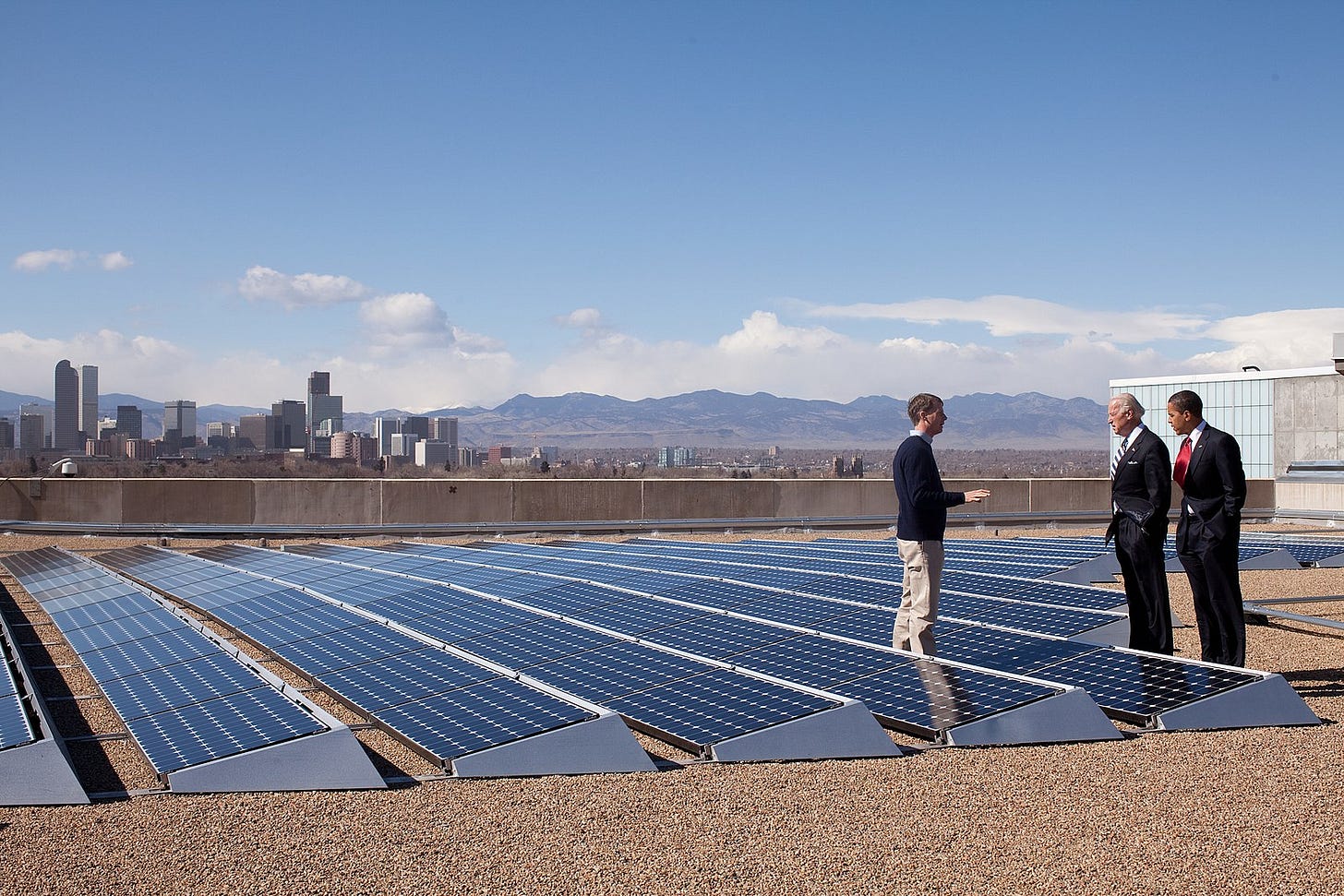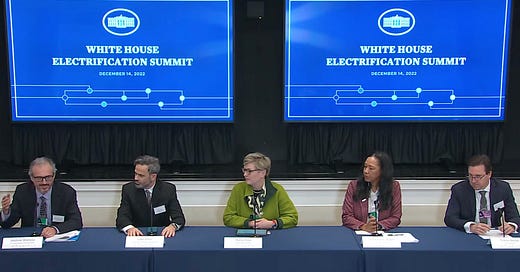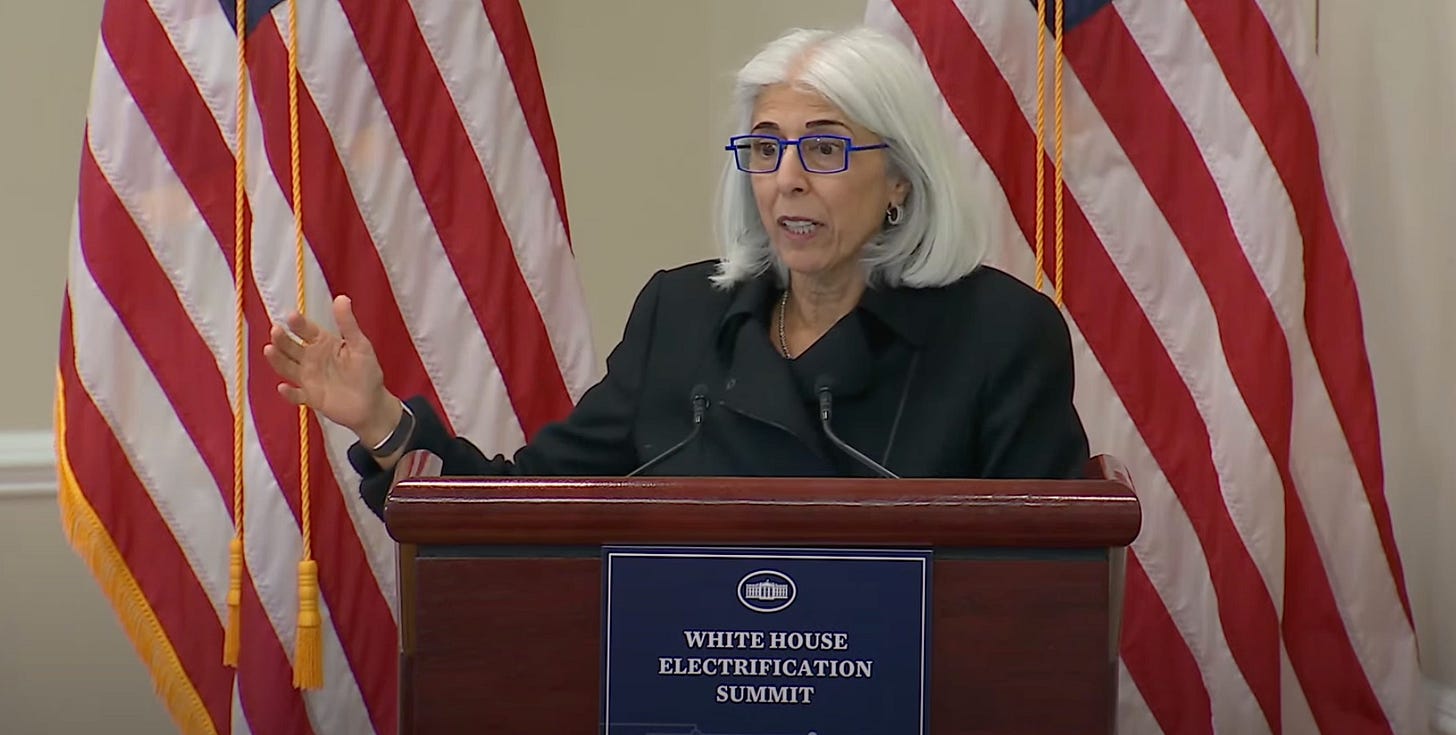Your Notes and Mine on the White House Electrify America Plan
The Biden administration is holding an "electrification summit" and here's where to post relevant links, reactions, and questions.
I hope you can watch the White House Summit on paths to electrifying the nation - from household kitchens and heating and cooling to factories to highways - as a path toward boosted energy efficiency and reduced carbon dioxide emissions and other pollution.
Add your reactions and questions in the comment thread. I’ll annotate the agenda below with my notes, outside reactions (via Twitter etc.) and relevant links as time allows. I’ll also add links to your comments, replicating a process I worked out more than a decade ago doing my “Annotated” posts on my Dot Earth blog at The New York Times. This post will be maintained as a living document serving as a guide to how things do, or don’t, play out.

Shortly after Joe Biden was elected, I wrote a commentary for the Bulletin of the Atomic Scientists offering my vision of how to gauge and drive success on climate and energy policy and action: “To build climate progress on time scales that matter, Biden should be Biden.” I essentially said don’t focus on the first 100 days or even a first term. Focus on what can be done to build enduring trajectories toward a climate-safe energy system and societal capacity to withstand today’s and tomorrow’s climate impacts.
That is precisely what the hundreds of billions of dollars available under the Bipartisan Infrastructure Law and climate components of the Inflation Reduction Act can do (along with climate-relevant investments authorized, but still to be appropriated, under the bipartisan CHIPs and Science Act, as Robinson Meyer nicely summarized in The Atlantic awhile back).
This summit is a helpful outline of the strategies and paths the Biden team is aiming to pursue. A big question now, of course, is what can still move forward with a divided Congress.
Happily, this is where letting Biden be Biden is key - and focusing on the politics of opportunity laid out in the packages I mention above more than a politics of restriction and division, as was tried in decades past and failed.
One key to success will be focusing less on “climate crisis” labels for policies and more on steps that have wide fundamental support (remember, there are no red and blue states when it comes to renewable energy and for funding clean-energy innovation).
While much of what you’ll hear at this meeting is about deployment of today’s technologies, keep in mind the vital need to simultaneously sustain public investment in basic research and development around tomorrow’s energy systems and fostering innovation capacity of the private sector. That was a core message from the experts in my Sustain What roundtable on the historic fusion milestone announced on Monday. Watch that webcast here or sift the very rough Trint transcript. (If you subscribe to my Sustain What at a supporting level, that can help me hire someone to clean up transcripts and generally improve this project.)
Let’s see how things play out from this meeting through 2023 and beyond.
Here’s the agenda. Post your thoughts and questions after you watch the event.
White House Electrification Summit
What will it take to meet our climate and equity goals?
1:00PM – 1:30PM | Opening Remarks
Arati Prabhakar – Director of the Office of Science and Technology Policy & Assistant to the President
Prabhakar, less than a day after rolling out the fusion breakthrough, provided a sense of the profound scope and depth of the changes that would be needed to transform to a post-carbon energy menu in America:
“On the one hand we are scaling deployment faster than it has ever been done before…. And at the same time it’s sobering to realize that we’re going to have to scale much farther and faster over an extended period of time if we’re going to get to net zero emissions by 2050, which we have to do in order to have a shot at avoiding the worst of climate change…. And that is a task that is going to require not just new innovation but new forms of innovation because the kinds of challenges that are ahead of us are deeply systemic.”
Jennifer Granholm – Secretary of Energy, U.S. Department of Energy
Brenda Mallory – Chair, Council on Environmental Quality
John Podesta – Senior Advisor, White House Office of Clean Energy Innovation and Implementation
Mitch Landrieu – Senior Advisor & Infrastructure Coordinator, White House
Geri Richmond – Under Secretary for Science and Innovation, U.S. Department of Energy
Martin Heinrich – U.S. Senator & Co-Chair, Bicameral Electrification Caucus
Kathy Castor – U.S. Representative, Chair of the House Select Committee on the Climate Crisis, & Co-Chair of the Bicameral Electrification Caucus
1:35PM – 2:05PM | Panel: Transportation Innovation
Moderator – Andrew Wishnia, Deputy Assistant Secretary for Climate Policy, U.S. Department of Transportation
Gabe Klein – Executive Director, Joint Office of Energy and Transportation
Maria Pope – CEO, Portland General Electric
Travis Hester – Vice President, EV Growth Operations, General Motors
Debra Gore-Mann – CEO, Greenlining Institute
2:05PM – 2:40PM | Panel: Buildings Innovation
The White House has published a guide to the Inflation Reduction Act that is well worth exploring and sharing.
Opening Remarks: Fedrick Ingram – Secretary-Treasurer, American Federation of Teachers
Moderator: Trisha Miller – Senior Director, White House Climate Policy Office
Alejandro Moreno – Acting Assistant Secretary for the Office of Energy Efficiency and Renewable Energy, U.S. Department of Energy
Alex Laskey – Founder & Executive Chair, Rewiring America
Laskey (@adlaskey on Twitter) made key points about the prospect for millions of new jobs, and with breadth and variety way beyond talk a decade ago of “green jobs.” Rewiring American produced an early report on the employment impact of widespread home electrification: “Based on an extensive industrial and engineering analysis, our new report demonstrates that an aggressive national commitment to electrify all aspects of our economy would create up to 25 million good-paying American jobs over the next 15 years and 5 million sustained jobs by mid-century.”
Ruth Ann Norton, president and CEO of Green and Healthy Homes Initiative Donnel Baird – Founder & CEO, BlocPower [a late change]
Norton emphasized how important it was that the Hope for Homes Act was incorporated into the Inflation Reduction Act. Under that package, as the Building Performance Association (a trade group with 20,000 members in relevant trades) explained on its website, “$9 billion will roll out..in 2023 to provide rebates for residential energy efficiency and electrification (HOMES and HEEHR) and contractor training grants.”
While the IRA was not bipartisan, this support shows the breadth of sectors supporting this part of an energy transition effort.
Katrina Managan – Director of Buildings and Homes, Denver Office of Climate Action, Sustainability and Resiliency
Managan described how Denver voters in 2020 approved a sales tax providing funds for climate action, with half the resulting $40 million a year targeted for under-resourced communities. She cited a study showing the transition to heat pumps is often cost effective. She noted important health benefits, saying, “In 30 percent of low-income homes in Denver, natural gas equipment failed carbon monoxide tests.”
2:40PM – 3:15PM | Panel: Electric Grid and Systems Innovation
Opening Remarks: Sean Casten – U.S. Representative & Co-Chair of the Sustainable Energy and Environment Coalition Power Sector Task Force
Moderator: Sally Benson – Deputy Director for Energy & Chief Strategist for the Energy Transition, White House Office of Science and Technology Policy
Rudy Wynter – President, National Grid New York
Chris Irwin – Program Manager for Transactive Energy, Communications, and Interoperability in Smart Grid, U.S. Department of Energy
Austin Keyser – Assistant to the International President for Government Affairs, International Brotherhood of Electrical Workers
Ann Rendahl – Washington Utilities and Transportation Commission
3:15PM – 3:30PM | Closing Remarks
Sally Benson – Deputy Director for Energy & Chief Strategist for the Energy Transition, White House Office of Science and Technology Policy
Ali Zaidi – National Climate Advisor, White House Climate Policy Office








Electrifying our World by Robert Hargraves is available on Amazon. Free copies of the slides used to teach that course at Dartmouth are available for downloading at ElectrifyingOurWorld.com.
Be a better deal if we teamed up with Canada and Mexico.